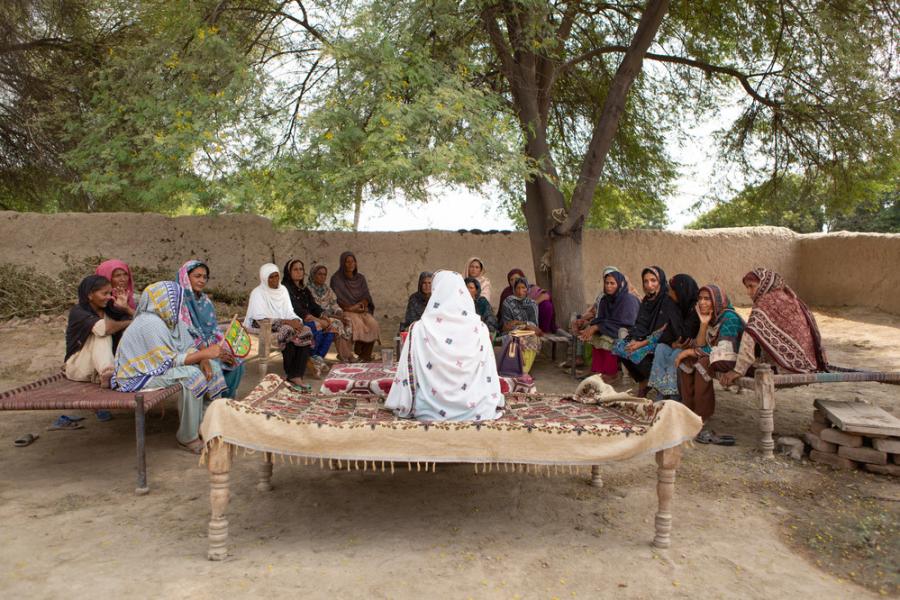Planting seeds in the new normal: Rural women in Pakistan amid COVID-19

IFAD is partnering with the Government of Pakistan to develop interventions that can help rural women continue to farm and generate an income.
Produced by IFAD Pakistan. To view the originally published article click here.
In rural Pakistan, women are important partners in agricultural development. They perform a variety of crucial tasks, including weeding and tilling land, planting seeds, collecting farmyard manure and harvesting. They are also responsible for cleaning, drying and storing grains.
Yet despite their role, these women often do not receive recognition for their contributions or share control of the income generated from this work. They also have heavy workloads, carrying out a wide range of off-farm tasks in addition to their agricultural duties. Studies show that a typical woman in rural Pakistan works an average of 15.5 hours a day, including 5.5 hours spent in caring for livestock, and has only 50 minutes a day to spend caring for her own children. Like other rural-dwelling women across the world, they are also the most likely to be deprived of access to basic social services and livelihood opportunities, and they are at particular risk for experiencing violence. The consequences of the COVID-19 pandemic have made these women even more vulnerable. The lockdown is causing untold misery for informal workers and the rural poor, given that many lack regular incomes and most have been separated from any access to economic activities. Millions of rural Pakistani families are now facing hunger and malnutrition.
In consideration of both the immediate and long-term needs faced by these women and their families, IFAD is partnering with the Government of Pakistan to develop interventions that can help these women continue to farm and generate an income.
A social safety net for rural women
Immediately after the crisis hit, the women were most in need of food and cash. Fortunately, IFAD was able to quickly organize a safety net through its Southern Punjab Poverty Alleviation Project (SPPAP).
Under usual circumstances, one of SPPAP’s activities is providing vocational training programmes to poor rural farmers. Before the lockdown, ceremonies for the programme graduates had been planned in three cities. The ceremonies still took place, but with an extra benefit – the Project Management Unit used them as an opportunity to distribute cash advances earlier than planned, as well as raise awareness about COVID-19 among the trainees. Each of the 523 graduate received a combination of a cash stipend and food aid, at an average value of about US$52 per graduate. Ninety-six per cent of this year’s graduates are women.
Before COVID-19 came to Pakistan, SPPAP had also been supporting the construction of low-cost housing across all of its participating districts. Now that the Government of Pakistan has relaxed lockdown measures for the construction industry, the Project Management Unit is back to work – and SPPAP has fully adapted its operations to comply with the necessary health and safety measures. Over 840 houses are under construction once again. Once they are completed, they will be available exclusively to women-headed households.

Vertical farming to enhance rural women’s livelihoods
The rural women participating in the ETI-GB project benefit from innovative agricultural technologies taught during project training sessions. During the COVID-19 crisis, they’ve been able to keep farming.
In early 2019, 500 women farmers in the region of Gilgit-Baltistan adopted the vertical farming technique for producing cucumbers. Over the past year, it has already shown several benefits over traditional farming: The production cycle is extended, allowing the women farmers to keep producing during what is normally the off season. The quality of the produce is more uniform, and the yield is up to eight times greater than typical yields from traditional farming.
Overall, this translates into an increased income, as well as a solid return on investment for both the project staff and participants (who had to contribute some initial startup costs). On average, the initiative has boosted local women’s income by up to four times and produced a 25 per cent return on investment.
Living in the new normal
Amid the challenges of COVID-19, the rural women of Pakistan carry on. The graduates of the SPPAP training course have received the aid they needed to get through the worst of the crisis. Their fellow beneficiaries who are eagerly awaiting a new house can be confident that it is on its way. The women in Gilgit-Baltistan have already planted their 2020 cucumber crop. They hope for another rich harvest in the autumn.
With the provision of timely financial support, hundreds of poor women across South Punjab have been able to meet their most pressing needs. These women’s capacity to cope with adverse shocks is partially due to the results of well-designed support projects with many built-in safety nets. But it is their determination that makes all the difference. The rural women in Pakistan, with their diligence, persistence, and resilience, are working together towards a better tomorrow.
Read more about IFAD’s work in Pakistan.
Learn more about IFAD’s response to COVID-19.




